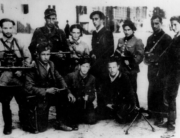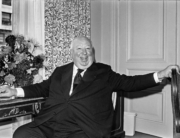
The story of Congressman John Lewis’s life is the story of the civil rights movement. For more than 60 years, “the boy from Troy,” as Martin Luther King Jr. liked to call him, has served on its front lines: he joined student sit-ins to protest Nashville’s segregated lunch counters in 1960 and spoke at 1963’s March on Washington and was beaten by Alabama state troopers on the Edmund Pettus Bridge during the 1965 Selma to Montgomery march. “The Voting Rights Act and John Lewis cannot be separated,” notes Speaker of the House Nancy Pelosi in Dawn Porter’s inspiring and moving documentary.
But it is a story that has not yet finished, as Lewis, now 80, acknowledges in the opening shot: “There are forces today trying to take us back to another time and another dark period.” President Trump is never mentioned, but the Supreme Court’s 2013 gutting of the 1965 Voting Rights Act and voter suppression by Republican-led states form the film’s backdrop. Director Porter toggles between Lewis alone in a studio watching archival footage, including images he had never seen before, and the congressman on the hustings in 2018, campaigning for a range of Democratic gubernatorial and congressional candidates (Stacey Abrams in Georgia, Colin Allred in Texas) and urging his audience to get into trouble, “good trouble, necessary trouble” if they see something unjust or unfair.
It was Rosa Parks’s refusal in 1955 to give up her seat on a bus in Montgomery, Alabama, that inspired a young Lewis to get into trouble. A letter to Dr. King resulted in a bus ticket to Montgomery and a meeting with the great civil rights leader and his mentor Ralph Abernathy. At Fisk University in Nashville, we see him study the philosophy and discipline of nonviolence with Rev. James Lawson. One of most chilling scenes is a clip of Lawson’s students rehearsing a sit-in and learning how to stay calm amid a barrage of n-bombs and other verbal insults.
In trying to cover Lewis’s political activism, the film gives short shrift to his personal life, most notably his 44-year marriage to Lillian Miles, although viewers see her influence in the artworks the couple has collected over the years. There are, however, fond memories from Lewis’s surviving siblings of his burning ambition to escape the family farm and get an education. His sisters describe how their brother would wear a tie and carry a bible to high school.
Likewise, the documentary doesn’t probe very deeply into the internal conflicts within the civil rights movement that resulted in Lewis being replaced by the more radical Stokely Carmichael as head of the Student Nonviolent Coordinating Committee in 1966. And it glosses over a bit of dirty politics when Lewis, running for a congressional seat from Georgia, challenged his rival and fellow activist Julian Bond to a drug test in 1986. Also omitted is Lewis’s December 2019 diagnosis of stage-four pancreatic cancer and his take on the Black Lives Matter movement.
Still, with testimonials from the likes of fellow legislators and longtime activists like the late Elijah Cummings, to whom the film is dedicated, and the new generation of progressives like Alexandria Ocasio-Cortez and Ilhan Omar, there is plenty here to give viewers, who enjoyed 2018’s Ruth Bader Ginsberg documentary RBG, encouragement and hope. “I still believe we shall overcome,” says Lewis.






Leave A Comment